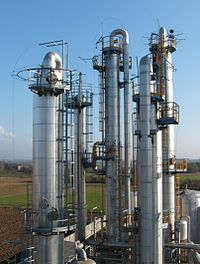Chemical engineer: Difference between revisions
| Line 4: | Line 4: | ||
fuck u |
fuck u |
||
== Overview == |
|||
[[Image:Nrc-bri-bioprocess-lr.jpg|thumb|right|250px|Chemical Engineers work in "Real Deal" Biotechnology Research Institutes]] |
|||
Historically, the chemical engineer has been primarily concerned with [[process engineering]]. The modern discipline of chemical engineering, however, encompasses much more than just process engineering. Chemical engineers are now engaged in the development and production of a diverse range of products, as well as in commodity and specialty [[chemical]]s. These products include high performance materials needed for [[aerospace]], [[automotive engineering|automotive]], [[biomedical engineering|biomedical]], [[electronics|electronic]], [[environmental engineering|environmental]] and [[military]] applications. Examples include ultra-strong fibers, [[Cloth|fabrics]], [[adhesives]] and composites for vehicles, [[Biocompatibility|bio-compatible materials]] for implants and prosthetics, [[gel]]s for medical applications, [[pharmaceuticals]], and films with special dielectric, optical or [[spectroscopy|spectroscopic]] properties for opto-electronic devices. Additionally, chemical engineering is often intertwined with [[biology]] and [[biomedical engineering]]. Many chemical engineers work on biological projects such as understanding biopolymers ([[proteins]]) and [[human genome project|mapping the human genome]]. |
|||
== Employment and Salaries== |
== Employment and Salaries== |
||
Revision as of 13:39, 18 November 2008

In the field of engineering, a chemical engineer is the profession in which one works principally in the chemical industry to convert basic raw materials into a variety of products, and deals with the design and operation of plants and equipment to perform such work.[1] In general, a chemical engineer is one who applies and uses principles of chemical engineering in any of various practical applications; primarily with respect to the study of the design, manufacture, and operation of plant and machinery in industrial chemical and related processes. A number of famous or historical chemical engineers can be found in the list of chemical engineers.
fuck u
Employment and Salaries
In the United States of America, the Department of Labor estimated in 2006 the number of chemical engineers to be 30,000. The average hourly wage for a chemical engineer was $39.23 per hour, but ranged from $24.07 to $57.05 per hour. The median annual salary for a chemical engineer was $78,860, with the middle 80 percent of chemical engineers making between $50,060 and $118,670 annually.[2] Chemical engineering has been cited as the highest-paying degree for first employment of college graduates.[3] Subsequently, a high-end salary grade is common to this profession in the USA.
In the UK, the Institution of Chemical Engineers 2006 Salary Survey reported an average over £53,000, with a starting salary for a graduate averaging £24,000[4].
See also
- American Institute of Chemical Engineers (AIChE)
- Distillation
- Fluid dynamics
- Heat transfer
- History of chemical engineering
- Institution of Chemical Engineers (IChemE)
- List of chemical engineering societies
- List of chemical engineers
- Mass transfer
- Process control
- Process design (chemical engineering)
- Process engineering
- Unit operations
- WikiProject: Chemical and Bio Engineering
References
- ^ Licker, Mark, D. (2003). Dictionary of Engineering", McGraw-Hill, 2nd Ed.
- ^ U.S. Department of Labor, Bureau of Labor Statistics: Chemical Engineers
- ^ Chemical Engineering Ranked Highest Paying Degree, Department of Chemical Engineering, Princeton University, February 15, 2006
- ^ Institution of Chemical Engineers Annual Review 2006
